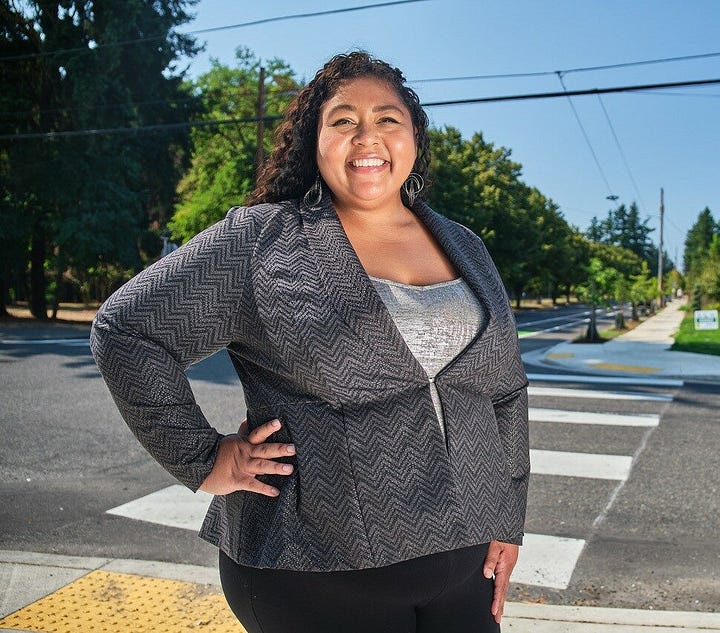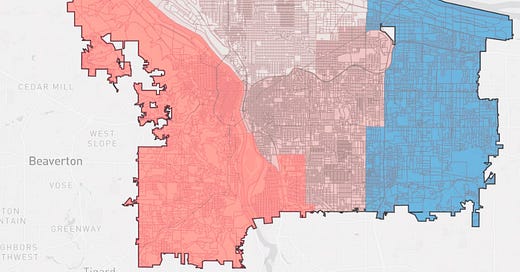Proportional Portland
The city's new electoral system is supposed to give voters more agency to elect their preferred leaders. What does that mean for Portland?
Did you know that Portland is the last major city without district representatives on its city council? Currently, all council members serve at large, meaning they can live anywhere in the city and—at least in theory—represent all Portlanders. That’s about to change this November when Portlanders will elect a brand-new council from four new districts.
So, is Portland adopting a more traditional approach to representation? Not exactly. Unlike most cities, where each district elects a single representative, Portland’s districts will each send three representatives to City Hall. This is part of Portland’s voter-approved shift to proportional representation, a system designed to reflect voters’ support for varying, and sometimes competing, platforms.
Majority No Longer Needed for Victory
Candace Avalos, an environmental justice advocate who served on the citizen-led Charter Commission that chose Portland's new electoral system, sees it as a way to level the political playing field.
“Running a citywide race is extremely expensive and prohibitive for anyone who's not backed by big dollars,” says Avalos, who ran against Carmen Rubio in the 2020 council election, only to see Rubio win in a landslide.
Now, Avalos is giving it another shot, vying for a seat in District 1, which encompasses neighborhoods east of 82nd Avenue. This time, she believes the rules are fairer for both voters and candidates. Instead of trying to reach voters across the entire city, Avalos and her fellow district contenders can focus solely on knocking on doors in their own quadrant. Thanks to a new voting method that lets voters rank candidates, they no longer need a majority to win. To secure a district seat, candidates simply need to capture 25% plus one vote. While that’s still a challenge in a district with roughly 106,000 voters, it’s a far cry from needing more than half of the citywide vote.
“Under the old system, large groups would rally behind a candidate, but they still couldn't reach a majority,” says Avalos, whose candidacy is endorsed by Carmen Rubio, her former rival. “For working people and communities of color, there was a huge disconnect between who got elected and who voters felt could actually represent them.”
Avalos predicts those groups are now more likely to succeed at electing their preferred city leader.
“Having three seats in each district both expands choices for voters and the ability for groups to organize around any issue. Whether you're in the majority or the minority, you're going to get more representation."
A Moderate Wave on the Horizon?
Proportional representation comes to Portland at an interesting time. Two recent elections show an electorate deeply divided on hot-button issues like public safety and homelessness. In 2022, Rene Gonzalez unseated City Commissioner Jo Ann Hardesty with 53% of the vote, promising “tough love” for the city’s unhoused population. Hardesty, who had focused on partially defunding the Portland Police Bureau and establishing Portland Street Response—a non-police team addressing mental health emergencies—faced backlash from voters seeking tougher measures on crime and homelessness. Similarly, in the 2023 Multnomah County District Attorney race, Nathan Vasquez narrowly defeated Mike Schmidt by advocating for stricter enforcement, in contrast to Schmidt's criminal justice reform platform that earned him a landslide win four years earlier.
The victories of Vasquez and Gonzalez have fueled speculation about a “moderate wave” in Portland, defined by support for law enforcement and stricter policies on public camping and drug use. Yet, a precinct-by-precinct breakdown by local polling firm DHM Research shows a more complex picture. Their analysis, which overlaid the new district map with recent election results, revealed that Gonzalez and Vasquez won comfortably in Districts 1 and 4, which include diverse, lower-income neighborhoods in East Portland and more affluent, whiter areas in the West Hills. In contrast, Hardesty and Schmidt prevailed in the southeast, northeast, and north neighborhoods that now form Districts 2 and 3, albeit by narrower margins.
This raises the question: Could Portland's first proportional election yield two council factions, each rallying behind a different approach to public safety? And could such a split elevate the importance of the first mayor elected under Portland’s new system, considering the mayor casts the deciding vote in the event of a tie on the 12-member council? This is especially significant as Rene Gonzalez, now running for Portland Mayor, campaigns on a platform promising "compassion without enabling" to address the city’s crises.
Diverging Views on Public Safety in Districts 1 and 4
At a recent event organized by Future Portland, a grassroots group supporting candidates with platforms similar to those of Vasquez and Gonzalez, District 4 candidate Eric Zimmerman emphasized the alignment between voters in Districts 4 and 1.
“Over the last two elections, our districts have voted the same way in city and county races. People focus on our wealth disparities and don’t expect us to align, but I’ve talked to a lot of candidates out there, and I see a strong alignment between the districts,” Zimmerman noted. An army veteran and chief of staff to County Commissioner Julia Brim-Edwards, Zimmerman advocates for boosting Portland’s police force and intensifying efforts to move houseless individuals into shelters equipped with mental health and recovery services. His platform has earned him endorsements from Nathan Vasquez, Rene Gonzalez, and the Portland Police Association, as well as multiple labor organizations and City Commissioner Carmen Rubio.
While Zimmerman and others were giving their pitches at the rooftop bar of the Society Hotel in downtown Portland, District 4 candidate Mitch Green was out canvassing with some forty volunteers from the Portland chapter of the Democratic Socialists of America. Green, an economist and self-described socialist, opposes Portland’s public camping ban and advocates for social housing, a government-owned affordable housing model that ties rent prices to residents' income levels.
“Is there a portion of this district that does not want to be represented by more moderate politics?” Green asks. “Yeah, I think so. I think there's a solid quarter that views their ‘moderatism’ as actually being quite conservative and is opposed to that kind of politics.”
Green, also an army veteran, enjoys support from Oregon's Working Families Party and several public sector unions. He’s currently the fifth-highest fundraiser among over twenty candidates in District 4, with the highest number of “micro-donations”, meaning contributions under $25.
“For those of us who are taking a progressive or socialist lane in District 4—it’s on us to go out and knock on doors and build that trust. When you have volunteers on people’s doorsteps who are passionate about your message, that’s something that can’t be bought with paid staff or campaign ads. Maybe that’s what gives us the bulwark and makes this system work as designed,” Green notes.
Expect an Election Night Surprise in East Portland, Avalos Says
In District 1, Candace Avalos is skeptical of the notion that Districts 1 and 4 are aligned around policies that rely on police to address homelessness and drug use. She notes that the three top fundraisers in the district—herself, Steph Routh, and Timur Ender—are all progressives who advocate for shifting Portland’s emergency response toward alternatives to policing.
"Community safety is a top priority for East Portland, but what we don’t want is the same people who are supposed to protect us causing us more harm,” Avalos says. “In East Portland, people have a lot of compassion for what they're seeing on the streets. Guess why? They're a lot closer to the people on the streets than they are to the people in the West Hills," she adds, suggesting that the strong support for Gonzalez and Vasquez in East Portland may have been skewed by low turnout rates.
“So the conservatives voted—okay. Who didn’t vote? The political class forgets who lives in East Portland: working people and people of color. I’m going to knock on every damn door, and I’m convinced we’re going to prove everyone wrong about East Portland.”
However, Terrence Hayes, another District 1 candidate, offers a different perspective. Hayes, the owner of a graffiti removal company, believes East Portland residents are “compassion-fatigued” over issues like public camping and drug use and would welcome more police officers—as long as the quality of policing is the same as in the West Hills.
“I hope we can become such a healthy city that we can minimize our police presence, but we're just not there yet,” says Hayes, who argues that East Portland needs city leaders who can bridge the gap between the community and law enforcement, teaching officers how to partner with residents who need, but sometimes fear, the police. Hayes, who advises the city on gun violence prevention, has personal stakes in this debate. His cousin, Quanice Hayes, was fatally shot by a Portland police officer in 2017, and Hayes himself spent nearly thirteen years in prison. After a judge vacated his sentence, his criminal record was expunged, and his candidacy is now backed by both Rene Gonzalez and the Portland Police Association.
“Our community is tired of mistreatment, but we're also tired of what happens when the issue of policing becomes polarized,” Hayes says. “When we defund the police, guess what happens? Officers say, ‘Okay, hope y'all like this. Hope it works out for y'all.’ And then when our community needs protection, the police won’t respond,” he says.


Factions Based on Issues May Be Fleeting
While public safety could play a pivotal role in the 2024 election, political scientist Paul Manson advises against overinterpreting any factions that form around candidates’ stances on law enforcement. Manson, a Research Assistant Professor at Portland State University, notes that proportional representation was primarily designed to capture voters’ lasting loyalties to political parties. In Portland’s nonpartisan system, voters may form allegiances to candidates’ identities, he says. Allegiances to the candidates’ platforms—not so much.
“You have to ask a fundamental question: how much does the average voter pay attention to and care about particular issues?” he says. “Organizing proportional representation around policy issues may be challenging. Policing in Portland, for instance, has swung largely due to events portrayed in the media—from excessive force and police brutality to calls for increased policing at Dawson Park. Voter preferences are probably pretty fluid here, reacting to cues or events in the news or how elites frame them—so proportionality based on issues might be fleeting.”
For Manson, who endorsed Portland’s reform measure, the most significant change brought by the new system is the closer connection between voters and their representatives. With a record number of candidates knocking on doors across the city, voting could become “hyper-personal,” he says.
“The upside is that constituent-based politics will likely prove powerful. Parks, potholes, parking—those can shift personal views even if larger policy positions aren't as salient,” Manson argues.
“In other words, it’s about answering the question for voters: ‘What’s in it for me to vote for you?’”







